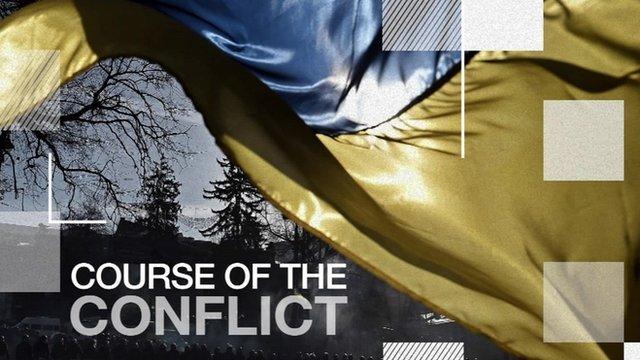Nato summit: Alliance 'stands with Ukraine'
- Published
- comments
Ukraine's President Poroshenko: "Stability and security brutally undermined by Russian aggression"
The Nato military alliance, at its summit in Wales, has said it "stands with Ukraine" in the face of Russia's "destabilising" influence.
Nato also called on Russia "to pull back its troops" from Ukraine and end the "illegal" annexation of Crimea.
UK government officials say fresh EU and US sanctions will be announced against Russia on Friday.
Separately, Ukrainian President Petro Poroshenko and rebel leaders said a ceasefire could be agreed on Friday.
Some 2,600 people have died in fighting between Ukrainian troops and rebels. Ukraine's military says 837 its soldiers have died since the conflict erupted in April.
In a statement delivered by Nato Secretary-General Anders Fogh Rasmussen, the alliance also called on Russia "to step back from confrontation and take the path to peace".
Nato's partnership with Ukraine was "strong" and the alliance was "determined to make it even stronger", including developing the ability of Ukrainian and Nato forces to work together.
Addressing reporters later, Mr Rasmussen said no-one wanted conflict with Russia and the best way forward was a political solution.
Russia denies arming pro-Russia rebels in eastern Ukraine or that it has deployed troops in the country.
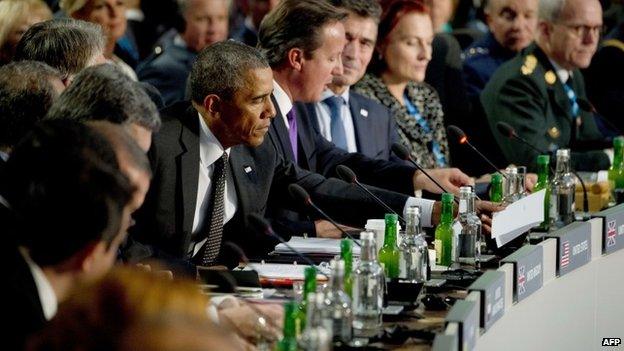
The summit has also called for Russia to end the annexation of Crimea
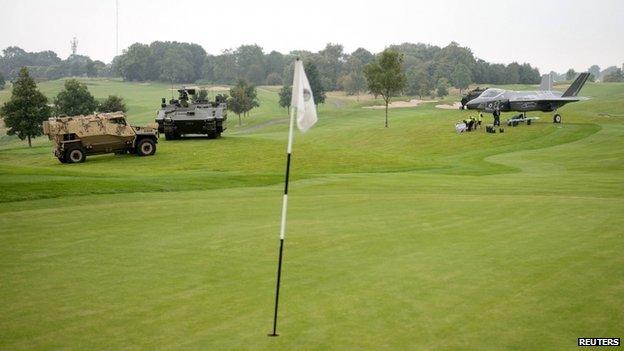
Correspondents say the Nato summit in Wales is the most important in decades
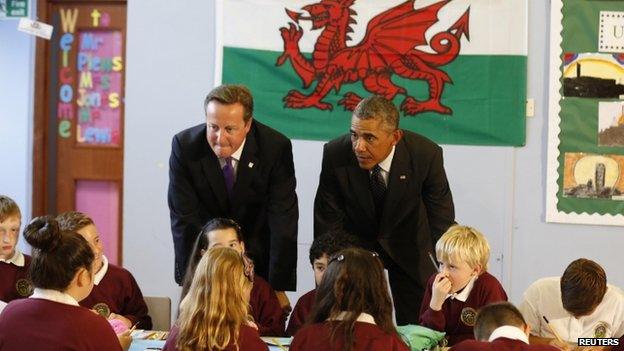
David Cameron and Barack Obama visited a school in Newport on Thursday ahead of the summit
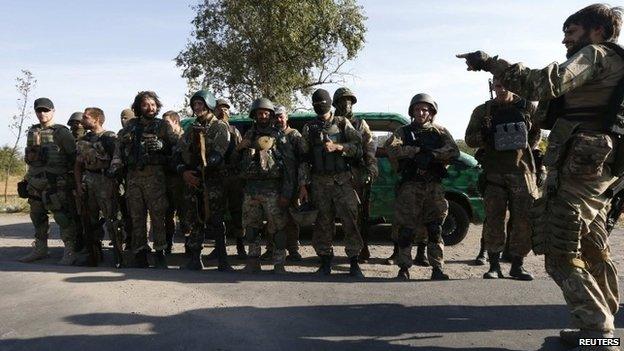
Ukrainian government forces are manning checkpoints in Mariupol - as rebel shelling was heard in surrounding areas
The fresh sanctions to be announced by the United States and the European Union on Friday are expected to include further restrictions on the banking, energy and defence sectors.
More associates of Russian President Vladimir Putin will have travel bans imposed on them, and more banks owned by the Russian state will be banned from accessing the financial markets, UK government officials told the BBC.
At the Nato summit, French President Francois Hollande said an EU decision on imposing further sanctions on Russia would depend on what progress was made towards peace in Ukraine in the coming hours.
He had earlier signalled a toughening of European policy towards Russia on Wednesday by suspending a military deal worth 1.2bn euros ($1.6bn; £0.95bn).
Mariupol threatened
Ukrainian government forces have recently suffered several losses of territory, after rebels launched offensives in both the Luhansk and Donetsk regions, and further south around the city of Mariupol on the Azov Sea.
Reports are emerging that the separatists have begun shelling the outer defences of Mariupol. At least two military vehicles were seen on fire in the area, and eyewitnesses spoke of gunfire.

At the scene: Fergal Keane, Mariupol
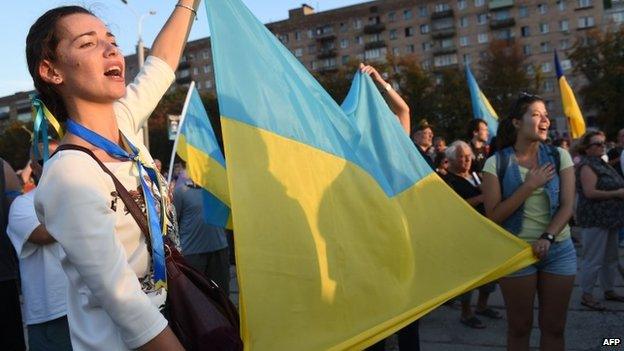
Mariupol residents hope for peace but brace for war
Tonight we can hear explosions close to Mariupol. These come after a day in which rebel forces pushed towards the city from the recently taken town of Novoazovsk.
At a Ukrainian government position on the edge of Mariupol, troops told us they had pulled back after coming under fire from what they claimed were Russian tanks.
However, when the local governor Serhiy Taruta arrived on the scene, he insisted there had been no retreat. "It is just our soldiers relieving other soldiers on a rotation," he said.
The situation is confused and the atmosphere volatile. At one point a vehicle arrived with a wounded man. The soldiers - from the volunteer "Azov" battalion - screamed at journalists to put down their cameras.
Later, several hundred people gathered in Mariupol to demonstrate for peace. They will be hoping the talk of a ceasefire plan becomes a lasting achievement in the next few days. In the meantime, however, the city is bracing itself for war.

Meanwhile, President Poroshenko said the implementation of a peace plan - which includes a bilateral ceasefire - could start on Friday, a hope expressed earlier by Mr Putin.
The Ukrainian leader said this depended on Friday talks in Minsk between representatives of Ukraine, Russia, the pro-Russian rebels and the Organization for Security and Co-operation in Europe.
Mr Poroshenko said he was "cautiously optimistic" about the outcome of the talks.
Watch: Timeline summary of the Ukraine conflict
Rebel leaders were quoted as saying they would order a ceasefire at 11:00 GMT on Friday if the peace plan was agreed.
On Wednesday, Mr Putin announced a seven-point plan, including a halt to "active offensive operations" by the Ukrainian military and pro-Russia rebels, international ceasefire monitoring, unconditional prisoner exchanges and humanitarian aid corridors.
'Unacceptable' actions
During the two-days of talks in Wales, Nato leaders are also set to discuss the rise of Islamic State (IS), and Afghanistan where Taliban militants launched a deadly attack on a government compound on Thursday.
An IS video released on Tuesday showed the killing of US journalist Steven Sotloff, just days after the group beheaded another American reporter, James Foley.
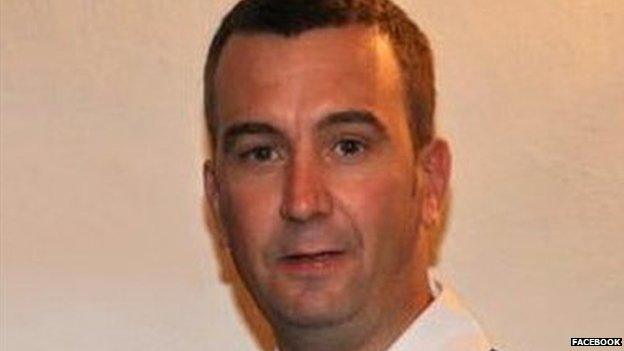
David Haines was captured in March last year with an Italian aid worker and two Syrians
In the latest video, an IS militant is also seen threatening to kill a UK hostage, aid worker David Haines, who was seized in March 2013 in Syria's Idlib province.
In other developments:
A senior figure in IS was killed in an Iraqi air strike, external, Iraq says
Nato renewed it commitment to Afghanistan, including training beginning in 2015 once the legal position is agreed with the Afghan authorities
Nato Secretary-General Anders Fogh Rasmussen: "Putin wants protracted, frozen conflicts in the neighbourhood"
The summit is considered Nato's most important for decades, as leaders faced the question of whether the alliance is equipped to deal with 21st Century challenges.
Moscow's actions in Ukraine have raised fears among Nato states bordering Russia, including Lithuania, which has a sizeable Russian-speaking minority.
Lithuanian President Dalia Grybauskaite told the BBC that if Nato did not face up to the challenge "sooner or later we will be facing the aggressor near our border, literally".

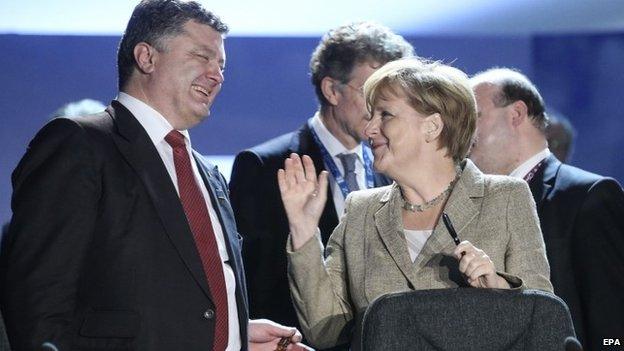
President Poroshenko has been given strong backing at the summit, but Nato will only go so far
Ukraine may be a partner-country of the Atlantic Alliance but it's a friendship laced with a heavy dose of pragmatism.
That's why Ukraine's president - who has been publicly feted here at this summit - is nonetheless moving towards a ceasefire with Russian-backed rebel forces.
In public Nato's message is one of resolve; full-backing for Ukraine's sovereignty and territorial integrity combined with strong criticism of Russia's policies.
But there is another message too - one that is trumpeted less by Western leaders - essentially telling Ukraine that any practical help that Nato may give Kiev will be limited and will be more a prospect for the medium term.
What matters now is to de-escalate the crisis. There will be no Nato weapons or Nato troops. What the alliance is doing is essentially re-emphasising its defence lines on Ukraine's western border. And if this means that Kiev has to make concessions to Moscow, then so be it.



- Published3 September 2014
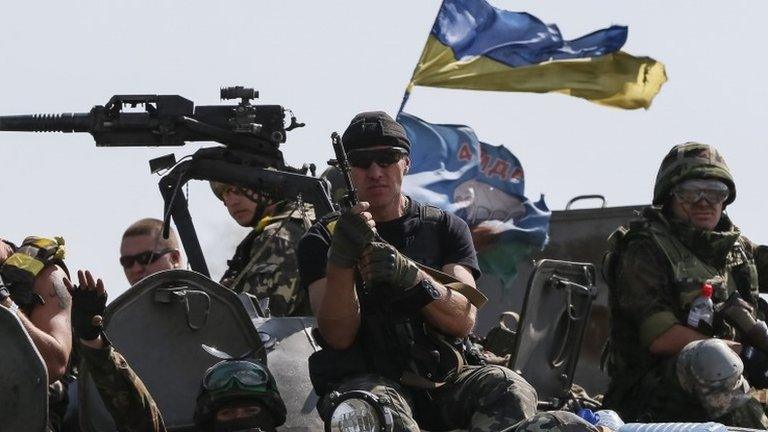
- Published4 September 2014
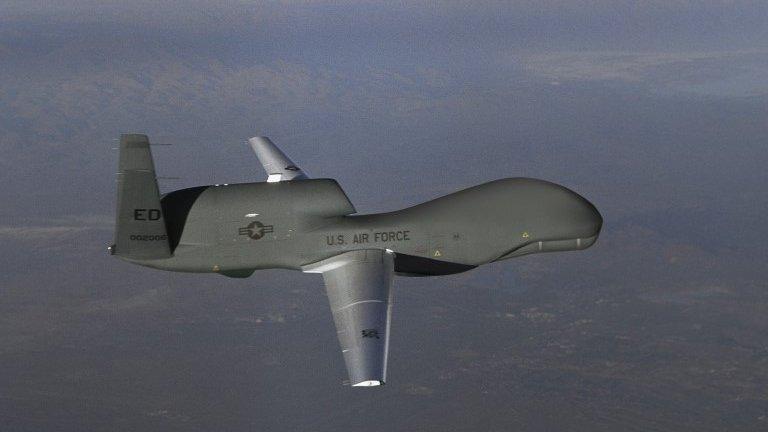
- Published3 September 2014
